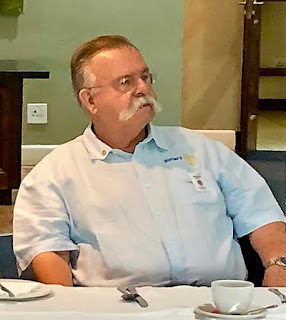It was a Business Meeting and quite a lot of time was spent discussing our up and coming Art Exhibition at the end of the month.
Roger Lloyd is chairing the committee and obviously he and the committee have been working very hard to put things together and Joan Sainsbury has, as usual, been working very hard with the artists.
The most important thing is that we, as club members, provide as much support as is required. Because the nature of the exhibition has changed President Jean is effectively turning the exhibition into 10 Rotary Days. We no longer have to concentrate on selling the paintings but rather on selling Rotary, not just for our own club but for others as well because not everyone who is interested in Rotary is able or even wants to come to a Friday lunch at Wanderers.
There has been some discussion on asking other clubs to participate for their own Rotary Days and I think that is a very good idea because we need to grow Rotary and not to be parochial about it. I think it's an excellent idea that we showcase other clubs and what they do and when they meet because it does give the public more of an idea what Rotary stands for and gives them an idea as to how different clubs become involved.

The Rotary Blanket Drive
It starts on Friday until Sunday and the club, as usual, is supporting this extremely well. We will be at Pick 'n Pay Centre on William Nicol. We have always done extremely well in the past but we know we don't have the huge corporate input this year.
This Week
The Inner Wheel International President, who is Australian, visited South Africa recently and Bedfordview Inner Wheel Club took her to visit Lambano....which I had never heard of.
I just happened to pick up my wife's folder, she is a member and was astounded at who they were and what they had planned. They started as a shelter for abandoned HIV/AIDS babies in 2001. Of course most of them died so very quickly they established a paediatric hospice which currently can accommodate 18 children and is accredited by the Hospice Palliative Care Association of SA and is monitored and evaluated by them on an ongoing basis in every aspect from financial, governance and quality assurance. They are looking to build a much bigger Hospice that will be able to take in children financed by Medical Aid who will then effectively subsidise the current children and their successors who are there at no cost to themselves.
They have the land already as well as funding from overseas to build the premises which will be in Kensington. What they do need is the office equipment and medical equipment as well as the necessary beds, cots etc.
 |
| Stewart Mutokonya will be talking to us and I hope Evelyn Makanda as well |
Now-a-days HIV/AIDS babies do not die so Lambano has had to expand its activities into have houses with house mothers as they now have young people in matric...something they never anticipated!
Back to the Hospice. This will be the first purpose built paediatric hospice in the country, possibly even on the continent and Lambano see it as just being the first because there is such a huge need and the long-term plan is to have one in every province.
Rotary Club of Genève International, Switzerland
Chartered: 2015
Original membership: 31
Membership: 53
Chartered: 2015
Original membership: 31
Membership: 53
Bucking conventions: In Geneva, a cosmopolitan city that is home to tens of thousands of expatriates, a club for English speakers was an apt idea. As the European seat of the United Nations, the city hosts 179 permanent missions, along with the offices of hundreds of nongovernmental organizations and multinational corporations. The Rotary Club of Genève International reflects this diversity, with members representing more than a dozen nationalities.
Club innovation: The club is committed to bringing young people into Rotary through Rotaract and Interact. As one of their first actions, members drafted a plan to establish an English-speaking Rotaract club, followed by an Interact club — a goal it met within two years. Rotarians and Rotaractors work together on projects, and mentoring is central to the club’s culture.
The Rotary Club of Genève International wasted no time in getting to work in 2015: Members including Walter Gyger, a retired diplomat and RI’s principal representative to the UN Office at Geneva, worked their connections to organize a fundraising gala to support Syrian refugees in Lebanon. The event was a joint effort with the UN High Commissioner for Human Rights.
With a number of former Rotaractors among its members, the club decided to focus on young people. “We call it engaging the next generation instead of working the pipeline,” says Royston Flude, who led the youth outreach initiative. Thanks to that effort, the Rotaract Club at the Graduate Institute of International and Development Studies was chartered in 2016 and, the next year, an Interact club was established on the La Châtaigneraie campus of the International School of Geneva.
“It is absolutely crucial to create a cascade into Rotary,” Flude says. When the club took on the ambitious task of running events for the 2017 Rotary Day at the United Nations in Geneva, the Rotaractors stepped up as active partners. The gathering drew 1,200 attendees representing more than 80 nationalities, Gyger says, adding that “because of the involvement of the Rotaractors, about one-third of participants were younger than 35.”
The Rotary club has a robust mentoring program for Rotaractors. “You have people going through large career jumps, especially those just coming from universities to their first management job,” Flude says. “We’ve held career fairs and events on interviewing techniques. Rotary is providing mentoring — not just in career enhancement, but in life.”
The club encourages Rotaractors and Interactors to attend its meetings, always mindful of practical matters such as expenses. “The InterContinental isn’t the cheapest place,” Flude says of the luxury hotel where the club meets, so the Rotarians fund meals for Rotaract and Interact members. More important, the Rotarians never underestimate their younger cohort: “We park ego,” Flude says.
A case in point is the club’s involvement in the Classroom to Boardroom entrepreneurship program, offered through the International School of Geneva. “Students create a quasi-business and go to an international organization such as the World Bank or International Committee of the Red Cross, and over a week, they offer solutions,” Flude says. “The Interactors showed these organizations how they could digitize the marketing and appeal to young people.”
Rotary benefits when young people get involved in its programs, Flude says. “When you get someone who is an Interactor, immediately you’re connected to the parents, the grandparents, and a community in the classroom and the school. For every Interactor you get on board, you probably get a connection with four to 10 people. It’s a brilliant opportunity.”















































